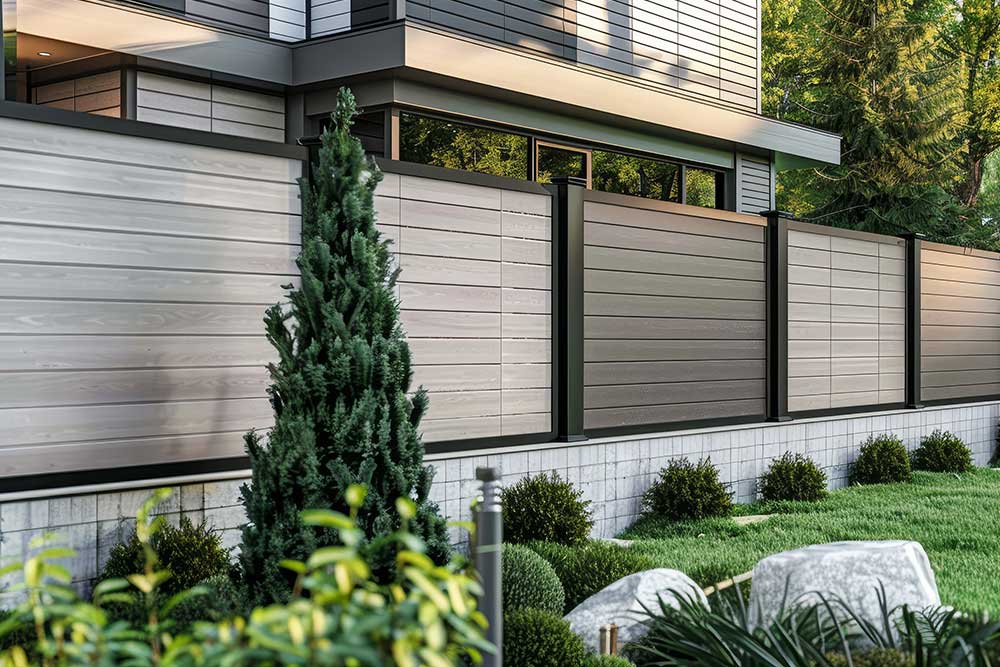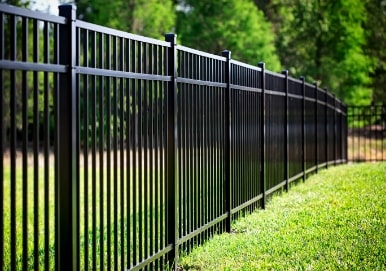Is your fence just a boundary, or does it define your outdoor space? When deciding between composite vs. vinyl fence, you’re looking for more than just a functional divider. You’re choosing an element that enhances your home’s privacy, security, and style.
Both materials offer distinct advantages depending on your lifestyle needs. Let’s find out which one matches your vision and will fit seamlessly into your backyard retreat.

Durability and Strength
Composite fencing consists of a mix of wood fibers and plastic. This gives it the appearance of wood with the added benefit of increased resistance to moisture, insects, and rotting.
The combination of these materials creates a dense structure that withstands high winds, physical impact, and extreme weather conditions. Unlike traditional wood fencing, composite does not warp, splinter, or crack under fluctuating temperatures. Its reinforced design makes it a strong option for areas prone to harsh environmental factors.
Vinyl fencing, constructed entirely from PVC, holds up well against moisture and pests. It does not absorb water, which prevents issues like rotting and mold growth.
While it stands strong against heat and sunlight, freezing temperatures can cause it to become brittle over time. In cold climates, vinyl panels may develop cracks if subjected to repeated impact or stress. Though it remains resistant to common forms of deterioration, its ability to endure physical force is lower than that of composite materials.
Appearance and Style Options
Composite fencing provides a more natural aesthetic due to the presence of wood fibers. It comes in various shades, including darker tones that resemble aged wood. Many fence installation services bring finishes with textured grain. This makes composite fencing a close visual match to traditional timber.
Over time, its color stays relatively stable, with minimal fading compared to other fencing options. The wide variety of designs allows homeowners to customize their fencing while maintaining a high-end appearance.
Vinyl fencing has a smooth, polished look that remains consistent throughout its lifespan. It is available in standard colors like white, tan, and gray but does not offer the same range of textures as composite fencing.
The limited palette may not appeal to those looking for a more natural or customized style. Though it does not require staining or painting, vinyl can appear less authentic in comparison to composite options, particularly for homeowners wanting a rustic or classic wood-like look.
Maintenance and Upkeep
Composite fencing requires occasional cleaning with water and mild soap to remove dirt and mildew. The blend of wood and plastic prevents many common issues associated with traditional wood fences, such as insect damage and rot.
However, mold and algae can develop in damp or shaded areas, which may require additional care. The material does not need sealing, staining, or repainting. This makes it a low-maintenance option for those seeking long-term convenience.
Vinyl fencing is nearly maintenance-free. It does not absorb water – preventing the growth of mold and mildew in most cases. Regular rinsing with a garden hose removes dirt and debris. Meanwhile, stubborn stains from algae or pollutants may require a mild cleaning solution.
Since vinyl does not require paint or sealant, its upkeep remains minimal. However, in areas with high humidity, green or black mold stains may appear, requiring periodic attention to keep it looking fresh.
Cost Considerations
Composite fencing tends to have a higher upfront cost due to the combination of materials and its durable build. The initial investment covers both the material and fence installation. However, long-term savings come from its minimal maintenance needs.
Different from traditional wood, composite does not require staining, sealing, or frequent repairs. This makes it a cost-effective choice in the long run. Though more expensive at first, its extended lifespan offsets the initial expense over time.
Vinyl fencing is generally more affordable at the time of purchase. Its lightweight nature and interlocking panels make installation quicker and easier, reducing labor costs.
Nevertheless, while the initial price is lower than composite, repairs can be costly. If a vinyl panel cracks or breaks, replacing it may require an exact color match, which can be challenging. Over time, exposure to sunlight and temperature changes may lead to brittleness. This will increase the likelihood of replacement costs.
Environmental Impact
Many composite fencing brands incorporate recycled materials. This makes them a more sustainable option. The wood fibers used often come from reclaimed wood. Meanwhile, the plastic content repurposes waste that would otherwise end up in landfills.
The combination reduces the need for raw materials. This makes composite fencing a choice that aligns with eco-conscious building practices. Since it lasts for decades, it also decreases long-term waste compared to traditional wood fencing.
Vinyl fencing is made entirely from synthetic materials, which do not break down naturally. While some manufacturers use recycled content, PVC production relies on fossil fuels. Therefore, it is less environmentally friendly. Though durable, vinyl is not biodegradable, and disposing of old fencing can be a challenge. Those looking for a sustainable option may find composite fencing more appealing due to its mix of recycled and long-lasting materials.
Installation and Repairs
Composite fencing is heavier than vinyl, requiring solid posts and a secure foundation. Installation often involves securing each panel with durable fasteners – adding to the labor and time required. Due to its density, handling and cutting composite fencing can be more challenging compared to vinyl. If a section gets damaged, repairs might be more involved. Color matching and replacing sections require precise adjustments.
Vinyl is lightweight. Therefore, fence design and installation are more manageable. Many systems use an interlocking design so that panels can snap into place with minimal effort. However, if a panel cracks or breaks, repairs can be difficult due to the need for an exact color match. Since vinyl does not age like wood or composite, older panels may fade differently than new replacements.
Composite vs. Vinyl Fence: Which Fence Lasts Longer?
Composite fencing comes with a lifespan of 20 to 30 years with minimal wear. Its resistance to weather-related damage, pests, and moisture makes it a strong long-term investment. Different from wood, it does not warp or degrade over time, maintaining its integrity for decades.
Vinyl fencing also lasts for decades, with many fences holding up well for 20 to 30 years. On the other hand, extreme weather conditions, particularly in cold climates, can affect its durability. Brittle panels may crack, and strong winds can impact lightweight sections. While vinyl remains a long-lasting option, the composite’s strength gives it an advantage in harsher conditions.
Quality Fencing Solutions for Homes & Businesses in Richmond, VA
Choosing the right fence for your property is an important investment. Locally owned and operated, Good Neighbor Fence has been serving the Richmond, VA, area since 2006 with high-quality residential and commercial fencing solutions. With over 200 five-star reviews, we take pride in offering reliable installations and workmanship warranties, competitive pricing, and customer service that goes beyond expectations.
We make the process simple with fast, free quotes and financing options starting at 0% APR. Call us today at (804) 737-4664 or request a quote online to start your project. Let’s build a fence you’ll love for years to come.





